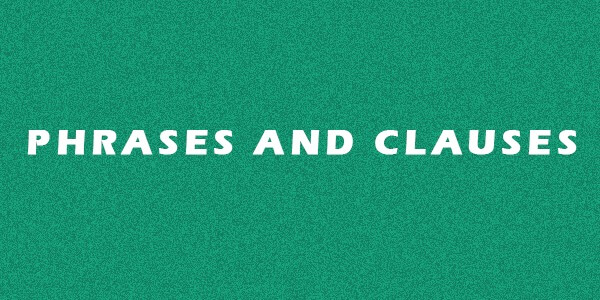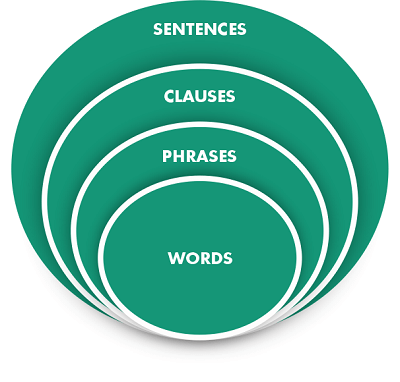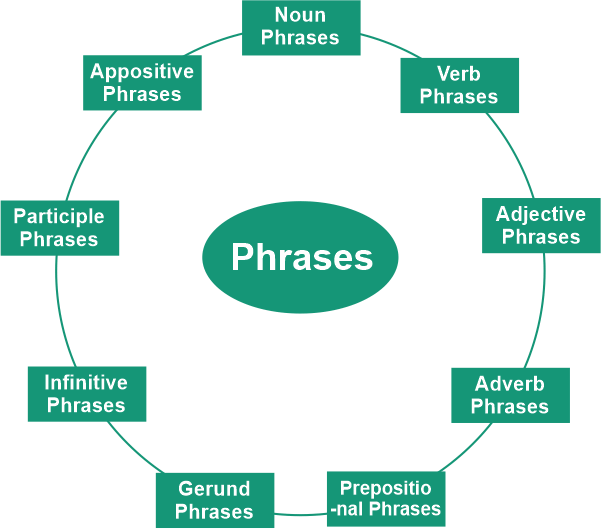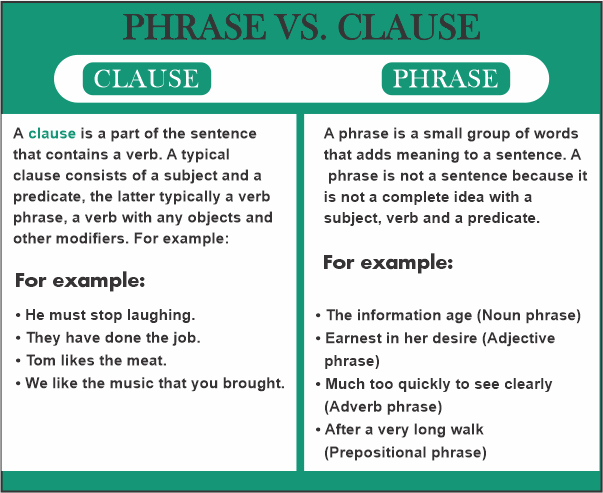Phrases and ClausesClauses and phrases are collections of words that serve as a cohesive block within a statement. Phrases can be defined as the set of words that could contain both a partial subject and the verb, but not both. In fact, it could have neither. A subject never performs the task of a verb in a phrase. 
But by definition, a clause is a set of words and comprises of the subject and the verb. Any quantity of clauses and phrases can be combined to form a sentence. Phrases and clauses are the cornerstones of sentences. Despite being able to function as a part of speech, phrases cannot be used as whole sentences. A phrase works as a single unit of speech because of the way its words interact. Phrases, for instance, can serve as nouns, verbs, adjectives, or adverbs. Understanding how various phrases work will help you avoid inserting them incorrectly or leaving them hanging in sentences. A subject and a predicate are found in clauses, which are collections of words. Independent clauses can function as coherent sentences and communicate a complete notion. Although they can function as elements of speech, subordinate clauses cannot represent a complete notion on their own. You must become familiar with the concept of "subject and predicate" in order to comprehend how the phrase and the clause in the sentence are used most frequently. Let's first define what the terms "subject" and "predicate" mean: What Exactly Are Subject and Predicate?The majority of the words we use when speaking or writing in English are fully understandable. For instance.
When combined, these words make a complete sentence. A sentence like this is composed by:
The subject of a sentence is anything that is explicitly or implicitly addressed in it when we speak or write it. The rest of the sentence, which provides information on the subject, is referred to as the predicate. Normally, the subject of the sentence comes before the predicate. However, this doesn't happen always as it can even come after the predicate. For instance, these are referred to as "imperative" or "descriptive" statements.
Sometimes the subject of an imperative statement is obvious. the like,

Definition, usage, and Examples of PhrasesCollins Dictionary describes a phrase as "a combo of words which constitutes a unit, either on its own or within a sentence" or "a brief set of words which individuals regularly employ as a manner of stating something." Typically, a phrase is a sentence fragment that makes some sense but not all of it. A phrase's meaning is frequently unclear since it lacks a subject and, occasionally, a verb. The following are some phrases as examples :
Phrases are characterized as words in bold. In this context, phrases serve as a single entity and can only include one grammatical function. They are also deepening the sentence's overall purpose. Types of Phrases
1. Noun Phrase: It refers to a single word or a group of words that contain a noun and serves as the subject, object, or predicate of a statement. A pronoun form of the noun phrase is also possible. Sentence Usage i. Jack arrived early today. So in the above sentence Noun Phrase is John Pronoun alternate: He arrived early today. Now let us see another example; ii. Portuguese citizens were getting ready for the festival. Similarly, in this sentence Noun Phrase is Portuguese People. Alternate pronoun: They were getting ready for the festival. Moving to the next, 2. Adjective phrase : It is a term or a set of words that characterizes the noun or a pronoun when used in a sentence. In the sentence, it may come either before or after the noun or pronoun. Sentence Usage i. Hardworking workers are generally undervalued. In the above sentence, Adjectival Phrase is Hardworking. ii. Katie was merely nervous to give the speech in front of her school. In the above sentence, Adjectival Phrase is Merely nervous. 3. Verb Phrase: It is the part of a sentence which comprises of both the verb and the statement's object. The object typically depends on the verb. Sentence usage i. I can smell the wonderful meal. So the verb phrase in the above sentence is 'can smell. ii. This automobile may be worth a thousand dollars ! Thus, the Verb Phrase in the above sentence is 'may be worth. ' 4. Adverb Phrase : It refers to the combo of two or more words that serve as an adverb (the adjectives characterizing the verbs) It is often known as an adverb phrase. An adverb phrase of two or more words can provide extra detail to the verbs, adverbs, or adjectives in the same way that an adverb changes the verbs, adjectives, or another adverb. Sentence Usage i. Park the bike right here, parallel to the doorway. So, the adverbial Phrase in the above sentence is right here, parallel to the doorway. (Note that the sentence also contains the prepositional phrase parallel to the doorway). ii. She managed the issue remarkably well. Adverb: remarkably well 5. Prepositional Phrase An object, a preposition, and any terms complimenting the object make up a prepositional phrase. Prepositional phrases typically serve to complement verbs in the form of adverbial phrases and nouns in the form of adjectival phrases. Sentence Usage i. I mostly purchase vegetables from 24x7 on the main road. Prepositional Phrase: on the main road. ii. The camel is found in the middle of the Desert. Preposition: in the middle of the Desert. 6. Gerund Phrase: It is a sentence that includes the gerund and any accompanying modifiers or predicates. A gerund is a noun created by adding ing to the root of a verb (3rd form of tense). No matter what, they will always serve as the subject, subject equivalents, or predicate. Sentence Usage i. Running bare feet on a lovely sunny afternoon. Gerund: Running bare feet. ii. Snacking while resting is a risky activity. So here in the above sentence Snacking while resting is a gerund. 7. Infinitive Phrase: It is a statement's combo of a verb and additional objects or modifiers. The immediate object of the sentence is typically the infinitive phrase. Sentence Usage i. To lay under the sky with a novel is my only savior. Infinitive Phrase: To lay under the sky with a novel. ii. A great technique of getting good marks in an exam is to study during the early hours. So infinitive phrase in the above sentence is " to study during early hours. This concludes our discussion of "phrases." Let's examine how to recognize clauses in a sentence now. Clauses: Use and DefinitionUp to this point, we have learned what phrases are and how to recognize various kinds of phrases within a sentence. Let's look at a few samples before moving on to our next topic, clauses :
The first sentence has a subject and a predicate if we look at it attentively. Who is the subject, and "borrow funds needlessly" is the predicate in the first statement. You have chosen the incorrect flashcard as the predicate in the following sentence, which has "you" as the subject. One subject, either specified or undefined and a corresponding predicate are present in each of these statements. These are referred to as clauses. Definition: A clause is a collection of words that functions as a single unit of speech. A subject and the subject's verbs or predicate are typically included. A phrase, which lacks a subject and occasionally even a verb, is not really a clause. An adjective, an adverb, or a noun can all be used in a phrase. Note: Once you begin practicing and working through the examples, the differences between these phrases and a clause will become more apparent to you. You'll learn the skill of phrases and clauses if you practice writing 20 sentences per day.Kinds of ClausesThere are primarily two kinds of clauses.
So that everyone knows what we mean by "both of them," 1. Independent clauses (each of which can stand alone as a sentence): A collection or cluster of words known as an independent clause includes both a subject and a predicate and also makes sense on its own. These kinds of clauses are frequently found in long phrases. These clauses are linked to other dependant or independent clauses in international tests to make it harder to determine the correct response. A few instances of independent clauses are provided below. Independent clauses are those that have been Italizcized.
Point to remember: Conjunctions or semicolons can also be utilized to link independent clauses. Two sentences can be joined together using conjunctions such as yet, and, because, etc. Several instances of independent clauses using conjunctions and semicolons are given below:
It is obvious from the sentences mentioned above that the elements highlighted in bold can operate as independent clauses and can be understood on their own. However, these are linked to yet another independent sentence by conjunction or semicolon. 2. Dependent clause (supportive element of a sentence): A dependent (subordinate or supporting) clause cannot be fully understood as a sentence because it lacks sufficient detail to convey the speaker's full meaning or thought. Although it too has a subject and a predicate, there is still some information that is missing. Here are a few instances to think about:
In the sentences mentioned above, we saw that despite having a subject and a predicate, the sentence sections Italicized could not fully express the speaker's meaning. Dependent clauses are the formal name for certain kinds of sentences. Phrases and ClausesUnderstanding the difference between a phrase and a clause will help you better grasp punctuation. I. As stated above phrases are a group of words without a subject performing a verb that may include nouns or verbals. Here are some examples of phrases :
These aforementioned examples all contain nouns (cat, wall, exam, disaster, ignorance, knowledge, hundreds, pieces). Additionally, you have a few verbs (moving, crashing), but in none of these instances is the noun acting as the subject of a predicate verb. All of them are phrases. 
II. As already stated clauses are a group of words with a subject performing an action verb. Here are few examples of clauses:
The subjects of the examples above are either nouns or pronouns (bold text and red) that are joined to predicate verbs (underlined and purple) in each instance. III. A clause is referred to as an independent clause if it can stand on its own and finish a sentence with punctuation. These independent clauses follow:
By using the proper punctuation, we may easily turn separate clauses into entire sentences. We could remark, "I hate people with bad character." Alternatively, we may say, "Oliva is uglier than Richard!" Because these kinds of clauses can stand alone, without any additional words connected, and form full sentences, we refer to them as independent clauses. IV. Dependent sentences have a subject performing a verb, but subordinate conjunction precedes them. The clause cannot stand alone and constitute a complete sentence because of the subordinate conjunction. Although it has a subject acting as a verb, the dependent clause is reliant upon another clause and cannot stand alone as a coherent sentence. Examples of dependent clauses include the following:
Since, when, and because are subordinate conjunctions that lead the listener to anticipate additional content. Since she smiles at timid men, you could stroll up to a friend in the dorms and just say, "since she," and walk out the door without introducing an independent clause; the friend would be confused. As the sentence or the thought isn't finished. The distinction between phrases, dependent clauses, and independent clauses must be understood since many punctuation marks, including commas, semicolons, and colons, only accept one of the three types of clauses.
Next TopicWhat is a Clause
|
 For Videos Join Our Youtube Channel: Join Now
For Videos Join Our Youtube Channel: Join Now
Feedback
- Send your Feedback to [email protected]
Help Others, Please Share









